QEP: Foundations of Science: Improving Scientific Reasoning Among Non-Science Majors |
SACSCOC Fifth Year Interim Report
Impact Report of the Quality Enhancement Plan
Brief Description of Sam Houston State University’s QEP
The goal of the Quality Enhancement Plan (QEP) at Sam Houston State University (SHSU) is to improve critical thinking and scientific reasoning in non-science majors. The plan required the development of a new interdisciplinary general education science course, Foundations of Science (FoS), which emphasizes the practice of critical thinking as embodied in the scientific method. The course uses group-based case studies and problem-based learning to engage students in active learning and to promote higher-order thinking. This course also focuses on students’ developing an understanding and appreciation of science as a reliable “way of knowing.” Because it is an interdisciplinary science course that seeks to promote a scientific understanding of the universe, it also focuses on developing an understanding of key scientific facts and theories from several disciplines.
The selection of the QEP topic was inspired by both institutional and external research. The internal research indicated that SHSU students had not been developing their ability to think scientifically or to grasp the nature of science. External research showed that a majority (78%) of college graduates in the U.S. were scientifically illiterate and lacked critical thinking skills, and surveys of the American public have shown that half or more reject major scientific theories that are fundamentally important to an accurate understanding of science as a whole and of the natural world. In addition, the acceptance by many Americans of a wide variety of pseudoscientific claims reflected a lack of understanding of the criteria that distinguish science from pseudoscience. This state of affairs suggested that traditional science courses, based almost entirely on lecture and memorizing facts, were not successful in promoting scientific literacy and critical thinking. This information, coupled with the recognition by the scientific community that scientific literacy encompasses both scientific reasoning and factual knowledge of science, led to the selection of SHSU’s QEP to improve both critical thinking and scientific literacy.
As planned, the QEP was implemented in the fall of 2009, following a baseline period in which non-FoS courses were assessed using the Critical Thinking Assessment Test (CAT), developed by Tennessee Tech University (TTU) with funding from the National Science Foundation, and the locally developed Foundations of Science Exam (FSE). Since that time, all students in the FoS course have been assessed, in a pre-post format, using either the CAT or FSE. In all cases, the assessment results have shown a highly statistically significant improvement of students’ scores on both assessments, whereas students in non-FoS courses have shown no change in scores.
Five sections of the FoS course were initially offered, with a combined enrollment of approximately 300 students. These sections were taught by three instructors from the Departments of Biology, Geography, and Geology, respectively. The number of sections has since varied from five to six per semester, and additional instructors have since taught the course. A summer section was added in 2012. A biology lab coordinator who played a significant role in the development of course materials originally supervised the labs; however, a new lab coordinator was hired in 2012, specifically to manage the FoS labs and to teach sections of both the lecture and the lab. The hiring of the lab coordinator dedicated exclusively to the FoS course was one of the original goals concerning the implementation of the course. This position is now a permanent position within the College of Sciences and, as such, it is not tied to a specific department. Because the course is taught by instructors from the Departments of Biology and Geography/Geology, it has been listed in the university catalog with BIOL, GEOG, and GEOL course prefixes. Having met newly developed state-mandated criteria for core courses, the course has been accepted into the new core curriculum.
Goals of the QEP
Based on the rationale and broad goals of the course stated above, the specific goals of the course are as follows: (a) understand and apply scientific terminology pertaining to the nature and conduct of science, such as hypothesis, law, theory, control group, operational definition, placebo effect, and double-blind study; (b) apply methods of reasoning used by scientists (i.e., the scientific method based on the requirements of testability/falsifiability, logical consistency, comprehensiveness of evidence, intellectual honesty [objectivity], replication of research, and sufficiency of evidence); (c) analyze and evaluate common logical fallacies and perceptual biases that interfere with the ability to draw reasonable and/or correct conclusions, as well as the difference among facts, informed opinions, and uninformed opinions; (d) demonstrate understanding of key concepts and theories from a variety of scientific disciplines, especially biology, geology and geography/earth science (e.g., Big Bang Theory, Plate Tectonics Theory, Theory of Evolution); (e) demonstrate an understanding of the nature of science by using this knowledge to evaluate extraordinary claims; (f) demonstrate how to distinguish science from pseudoscience by scientifically evaluating a wide variety of extraordinary claims that are common in our culture today; and (g) appreciate the role of science in our lives and the need for scientific literacy and critical thinking to help make informed decisions about issues currently facing society.
Changes to QEP
In almost all respects, the QEP has been implemented as intended. Some changes have been made, but the fundamental course design, assessment, faculty/staff development plans, and plan for the dissemination of results have been followed.
Changes in the Way the Course was Handled by Departments
The biggest changes to the original plan concerned the manner in which the FoS classes were handled within the departments and the number of sections taught over the 5-year period of the QEP. Originally, the plan was to have departments replace one or more sections of their traditional non-major science courses with the FoS course, resulting in no net change in the: (a) number of courses offered by the departments, (b) lab space needed to support the course, and (c) the number of faculty required to cover the course offerings. However, both the Biology and Geography/Geology Departments opted to retain all sections of non-FoS courses and to add the FoS classes to their suite of course offerings. The departments decided to do this because of the need to meet the institutional demand for their non-FoS courses, which has remained relatively unchanged in spite of the addition of FoS courses because of growth in university enrollments. In addition, the departments believed that a loss of any of their standard non-FoS courses might adversely impact the recruitment of majors to their programs. Consequently, this approach necessitated the hiring of an adjunct professor to teach sections of the FoS course, as well as the need to have the lab coordinators teach sections of the course (both lectures and labs). Fortunately, the hiring of an adjunct professor and an FoS-designated lab coordinator, coupled with certain changes in course rotations, enabled the university to continue offering five to six sections of the course per semester. These changes had no negative impact on the course and might have actually benefitted the course: Both the adjunct and the lab coordinator are both highly qualified to teach the course, and they do so enthusiastically. The adjunct faculty member has a Ph.D. in biology and has worked in science-related fields in the private sector. The lab coordinator has a master’s degree in biology and worked as the District Science Coordinator for Montgomery ISD (Texas) for 2 years before becoming the lab coordinator. Prior to that, he won Teacher of the Year at Dekaney High School in Texas. He developed an online version of the course, conducts data analyses, and has played a key role in maintaining IRB approval for our assessments.
The limited number of faculty currently available to teach the course, combined with limited lab space, has prevented the university from expanding FoS course offerings during fall and spring semesters, as was originally planned. This problem has been somewhat addressed by the addition of summer sections of the course and, beginning in the fall of 2013, the addition of an online section of the course. If this alternative pedagogical approach is successful, a larger number of students can be accommodated by the use of online sections with larger enrollments. It should be noted that the College of Education currently requires most of its majors to take the FoS course, and there is discussion of the possibility that the College of Business might also require this course for its majors. If this occurs, additional faculty will be needed to meet the increased demands.
Changes in the Manner in Which Points on the Assessments Were Treated as Part of the Grading System
In the original research design, the grades students earned on the CAT (and FSE) exam in the FoS course were to be considered part of their required grade and worth approximately 4-5% of the total possible points in the class. However, because the FoS team believed this approach might adversely impact students in non-FoS courses, who we assumed were not being taught FoS-related concepts concerning critical thinking, the points earned by the non-FoS students had to be considered extra credit points. When the time came to compare the FoS and non-FoS courses, though, the FoS team concluded that this difference in motivation might affect the effort put forward by students in the comparison courses. As a result, the FoS team decided to count the FoS scores as extra credit beginning in the semester in which the exam was given to the physics and chemistry classes (fall 2011). To further ensure consistency, the rules for awarding extra credit were the same in all classes, and the maximum amount of extra credit, as a percentage of the total grade, was the same in all classes.
Changes in the Assignments and Course Materials
During the first year of the FoS implementation, faculty realized the need to make a few course-based changes that were not part of the original design. By the second year, the FoS instructors had developed a custom FoS lab manual (now published by Hayden-McNeil). To date, this manual is in its fourth revised edition. Reading quizzes, which average approximately 60 to 70 questions each, were developed to encourage students to read the assigned material. In addition, detailed answer keys for these quizzes, to be used as study aids, have been made available to students upon completion of the assignments. These quizzes now count as a significant portion of their grade (approximately 12%). Additional sets of open-ended questions are also provided as study aids. During the past year, the reading quizzes were made available to students online through Blackboard, our university’s learning management system.
In addition, changes were made to the administration of the FiLCHeRS assignment. The FiLCHeRS assignment, as originally conceived, proved problematic because the students had not yet developed a solid understanding of the FiLCHeRS rules at the time of the first assignment. They did not yet have enough scientific information upon which to base an analysis of an extraordinary claim. Consequently, they had difficulty identifying suitable topics that they could handle early in the course. As a result, their performance on the first assignment was, overall, poor. In addition, and perhaps more important, the students lacked the writing skills necessary to respond properly to the first and second versions of the assignment. This issue suggests a need to address writing skills to prepare our students adequately for college-level work. Unfortunately, because this deficiency lies beyond the scope (and time constraints) of the FoS course, it could not be adequately addressed by the FoS instructors; although, attempts have been made to include more written responses to help address this issue. As a result, three alternative assignments have been developed as group homework activities. All incorporate some or all of the FiLCHeRS concepts, which serve as the critical thinking “backbone” of the course. These assignments now entail: (a) an analysis of arguments, (b) an analysis of a pseudoscientific device that is claimed to provide a host of health benefits to users, and (c) a capstone assignment that requires students to use information learned throughout the course to evaluate an extraordinary claim. These assignments, especially the latter two, require students to write short-answer responses to many of the questions (as opposed to writing mini-papers, as was required for the original FiLCHeRS assignments). This helps circumvent some of the issues associated with writing deficiencies while still requiring students to use critical thinking skills and scientific knowledge learned in the course.
Changes in Assessment Procedures
Overall, the assessment plan, especially its key components (e.g., CAT and FSE pre- and post-test assessments), have been implemented as planned. The FoS team had also intended to use the scores on questions from our students’ standardized course evaluations (IDEA scores) as another means of assessing the course; however, when we attempted to correlate these scores with the course goals using various statistical procedures (e.g., principle components analysis), we found that the questions did not correlate/cluster. We believe that this might have been due to the small number of questions and/or the attempt to use questions from the IDEA form that are not well suited for use in this type of assessment. Based on an inability to draw meaningful conclusions from these analyses, we did not use this assessment.
We had also planned for the Office of Institutional Research (OIR) to conduct several voluntary interviews with some of the students who had completed the course in order to obtain feedback. However, after completing one interview, the OIR concluded that this approach would not yield meaningful information because the group of students self-selected for this voluntary interview (and was, therefore, not a random sample). Also, the number of students who volunteered was quite small. We would note, however, the comments we receive on the IDEA forms and the e-mails we receive from students after the course is complete. Thus far, after five years, the e-mails and the comments have been very positive. Some students have indicated that this is one of the most important classes they have taken, and others have suggested that all students at SHSU should take it.
During the third year of the course, the FoS instructors added an additional assessment known as the MATE (Measure of the Acceptance of the Theory of Evolution), developed by Michael Rutledge and Melissa Warden. As implied by the name, this 20-question, Likert-scale instrument attempts to assess the degree to which students accept the Theory of Evolution. Given that approximately half of Americans reject evolution and that the FoS course was designed to address this issue, the FoS team merged this instrument with the FSE instrument. In effect, this instrument was seen as a way of gauging the success of the course by assessing the degree to which students were developing: (a) an appreciation of science as a reliable “way of knowing,” (b) a realization of the importance of a comprehensive, intellectually honest evaluation of evidence (e.g., genetics, geologic time, the fossil record, comparative anatomy, etc.) in reaching a conclusion, and (c) an understanding of what constitutes a good scientific theory. It was also seen as a way of gauging the degree to which the FoS course had alleviated the concern held by many students that science—evolution in particular—is a threat to their religious beliefs. Great effort was made in the course to address this misconception, which serves as a barrier to the acceptance of both the Theory of Evolution and the Big Bang Theory, in a positive way. It is important to emphasize that students were told, both orally and in writing, that these questions would not count toward their extra credit. In other words, students had no incentive to indicate greater acceptance of evolution on the post-course assessment given that there was no benefit to them for doing so.
Other Changes
As is to be expected in the development of a course, there were some minor modifications to the syllabus topics and sequence of topics. The only substantive topic change involved the deletion of the “Number Sense” topic. This change was necessary due to the alteration of the university’s academic calendar during the period of the QEP, resulting in a need to restructure the course curriculum and timeline. Additionally, some topics required more time to cover than was originally anticipated.
Impact of the QEP
The results of the assessments, as well as other developments, indicate that the QEP has had a very positive impact on students, many of the faculty, various departments/colleges within the university, and on other institutions (via presentations and dissemination of information about the course/course materials).
One of the primary goals of the QEP was to enhance the critical thinking of students who took the course. As mentioned previously, the results of the CAT exam (see Figure 1) show that the course has been highly successful in accomplishing this goal.
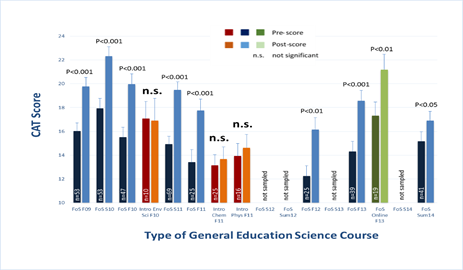
Figure 1. CAT scores for FOS and non-FOS courses, excluding the spring 2012 and summer 2012 semesters, in which it was not administered.
As indicated by Figure 1, students who took the FoS course showed a highly statistically significant (p < .001) increase in critical thinking as measured by the CAT exam. To put this improvement in perspective, TTU personnel stated that the amount of gain in this single course is equivalent to what most students achieve during 3-4 years of college. In stark contrast to the FoS results, students in the non-FoS biology (environmental science), physics, and chemistry classes showed no statistically significant improvement on the post-test.
As mentioned previously, the CAT and FSE grades originally counted as part of the required grade; however, for the reasons discussed above, they were subsequently counted as extra credit. Although the FoS grades decreased slightly when this change was made, students in the FoS course continued to show highly statistically significant increases in performance on the CAT exam. This suggests that motivational differences do not account for the difference in performance level between FoS and non-FoS courses. They strongly suggest the results are due to the nature of the FoS course.
With regards to the CAT scores, another indicator of the success of the FoS is the fact that the Center for Assessment and Improvement of Learning at TTU listed the FoS, and a description of the course, on its website as an example of the successful use of the CAT exam to document changes in critical thinking skills. TTU also asked the Chair of the QEP Committee to give joint presentations regarding the successful use of the CAT exam at three SACSCOC annual meetings.
The results of the FSE exam paralleled those of the CAT exam: With the exception of the summer 2012 FSE critical thinking component of the FSE exam, all FoS scores on the FSE exam showed statistically significant gains on the post-test, while no changes were observed in the non-FoS courses. Figures 2, 3, 4, and 5 below show, respectively, the overall score for the FSE and the average scores for the individual sections of the FSE exam (Nature of Science, Critical Thinking, and Factual Knowledge). That no significant change in the non-FoS course occurred on the section of the FSE concerning factual knowledge is to be expected given that these classes are not interdisciplinary in nature and do not cover the range of facts discussed in the interdisciplinary FoS course. However, this result highlights the importance of the FoS precisely because the lack of exposure to multiple scientific disciplines during college (and in high school) is one of the reasons that 78% of college graduates are scientifically illiterate. The same can be said of the Nature of Science and Critical Thinking results from the FSE (Figures 3 and 4, respectively).
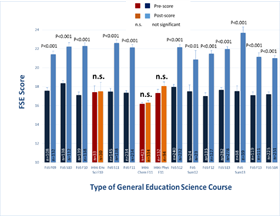
Figure 2. Overall scores for the FSE exam.
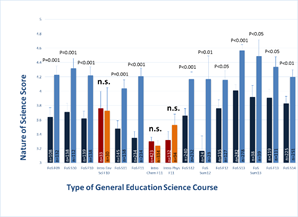
Figure 3. FSE–Nature of Science scores.
The results of the CAT exam for the summer of 2012 were not significant; however, when both summer sessions were combined in 2014, they were significant at the p < 0.05 level. These weaker results, relative to a regular semester, may be attributable to the shorter amount of time in the summer and the concomitant necessity of reducing the number of assignments in the course.
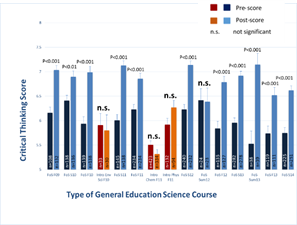
Figure 4. FSE Critical Thinking scores.
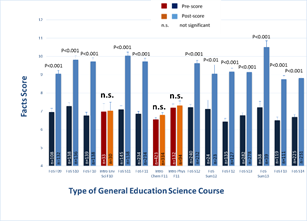
Figure 5. FSE–Factual Knowledge scores.
The MATE results (Figure 6) show statistically significant gains in the acceptance of the Theory of Evolution. The non-FoS courses showed no statistically significant change. Again, this is to be expected given that evolution is not discussed in these classes. Although it had not yet been discussed in the FoS course either (though students might have read the relevant material by this time), the attitude of FoS students toward evolution changed nonetheless. This highlights the fact that the FoS course specifically addresses the nature of science, the reliability of science as a “way of knowing,” and the evaluation of evidence using critical thinking–all of which is done to a very limited extent, if at all, in most traditional science classes.
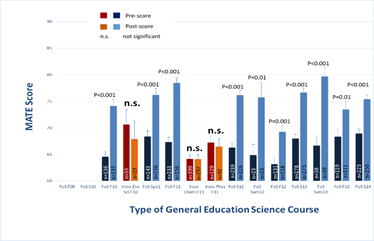
Figure 6. MATE results.
In sum, the students who have taken the FoS class have significantly improved their critical thinking and scientific literacy.
In addition to student impact within the FoS courses, the FoS has had broader impacts across campus and at other universities. As mentioned previously, the College of Education at SHSU began requiring most of its majors to take the FoS course in order to better prepare them as teachers. Given that these students will become teachers, the impact of the FoS will, presumably, extend into schools throughout the State of Texas and elsewhere. This is, perhaps, one of the most significant impacts of the FoS. Although anecdotal, members of the faculty in the College of Education have said that FoS students tend to perform better on assignments requiring critical thinking.
The FoS course places heavy emphasis on the use of case studies and problem-based learning (PBL), especially in the labs, wherein all exercises are based on these types of group activities. As a result of the success of the FoS, three PBL/Case Study Seminars have been hosted by the Professional Academic Center for Excellence (PACE Center) on campus. These seminars were designed to familiarize faculty members with pedagogies used in the FoS curriculum. In addition, the FoS team presented results of the FoS at a PACE teaching seminar hosted by the College of Humanities and Social Sciences. The overwhelming positive results convinced the college administration of the potential of the FoS concept and reinforced the desire to explore pedagogical approaches on campus. Indirectly, this contributed to the development of a new type of history course based on group learning/discussion activities. The results of the first semester of the course showed significant gains in positive attitudes toward critical thinking on the Critical Thinking Motivational Scale, though subsequent semesters’ results have not. However, based on other measures, such as enhanced writing ability, the course can be seen as having had a positive impact on student learning. Furthermore, at the request of the Provost, a member of the FoS team is now in the early stages of discussion with the developer of the EWCAT history course and the Director of the Academic Community Engagement Program to explore the possibility of developing a new academic program on campus that would emphasize critical thinking and civic engagement.
As just mentioned, one of the benefits of the FoS course has been the recognition by many faculty members of the importance of group-based learning activities. In addition to the seminars offered on campus, several faculty members, as well as the graduate lab teaching assistants (TAs) for the FoS course, have attended Case Study Seminars hosted at SUNY-Buffalo by Dr. Kipp Herreid, a national leader in the development and use of case studies. As a result, faculty at SHSU have benefitted from this approach and engaged in faculty development activities, and graduate lab TAs will be able to use these pedagogical tools when they become professors.
One of the positive impacts of the FoS course has been the development of professional relationships with people across campus and at other universities. The FoS team members come from different disciplines but, because they worked together to develop the course, they have had the opportunity to get to know one another and to share ideas and to teach one another. This experience has been very rewarding because of the intellectual stimulation it affords. In addition, many of the participants in the CAT grading sessions ended the sessions determined to develop new types of questions and activities that require the sort of higher order thinking reflected in the CAT exam. For example, the Chair of the Department of Biology has decided to embed critical thinking activities in designated sections of biology courses. Other faculty members have taken FoS concepts and incorporated them into their graduate classes.
Partly in response to the success of the FoS, a professor in the Department of Psychology and Philosophy undertook the editorship of Inquiry: Critical Thinking Across the Disciplines, a journal that had been previously housed at Bowling Green University. The professor asked two members of the FoS team to serve on the editorial staff of this journal and has also asked one member to succeed him as a co-editor of the journal when he retires. The decision to bring this journal to SHSU was directly tied to the fact that the teaching of critical thinking had been supported by the university in the form of the QEP. The professor also conducted a series of seminars on critical thinking on campus and included a member of the FoS team in these seminars. His goal was to help faculty members on campus better understand the importance of teaching critical thinking and to provide examples of how to teach it.
Members of the FoS team have made approximately 20 state, national, and international presentations: American Association of Geographers Conference–Savannah, Georgia (2010); invited talk by Associate Provost to science faculty–Texas Tech University, Lubbock, TX (2011); Society for the Study of Evolution Annual Conference—Portland State University, Portland, OR (2010); Alliance of Universities for Democracy (AUDEM)–Dubrovnik, Croatia (2011); SPIRE Post-doctoral Program, Invited presentation— University of North Carolina at Chapel Hill, Chapel Hill, NC (2011); Society for the Study of Evolution—University of Oklahoma, Norman, OK (2011); Society for Integrative and Comparative Biology, Salt Lake City, Utah (2011); American Philosophical Association Meeting—Chicago, Illinois (2012); Program in Ecology, Evolution and Conservation Biology Seminar Series - Invited seminar—University of Illinois (2012); Texas Association of Deans of Liberal Arts and Sciences–Sam Houston State University, Huntsville, TX (2013); invited talk to science faculty—University of North Texas, Denton, TX (2013); invited presentation to science faculty at First Annual College of Arts and Sciences Teaching Workshop at the university—Texas A&M University at Kingsville, Kingsville, TX (2013); Canadian Association of Geographers Meeting—Saint Johns, Newfoundland (2013); joint presentation on the CAT exam requested by TTU—SACSCOC Annual Meeting (2011, 2012, 2014).
In addition to these presentations, we have received requests from department chairs, faculty members, post-doctoral students, graduate students, and directors of institutions across the country and in Canada requesting information about our course, our procedures and assessments, and/or our course materials. Specifically, we have received requests from Clemson University’s Department of Philosophy and Religion; Dalhousie University, Halifax, Nova Scotia, Canada; Florida State University; Illinois Natural History Survey–Center for Biodiversity, Champaign, IL; Palo Alto College, San Antonio, TX; Southwestern Oklahoma State University; St. Olaf College, Northfield, MN; Texas A&M University; Texas A&M University at Commerce; Texas A&M University at Kingsville; University of Illinois, Urbana; University of Kansas; University of Hawaii – Manoa’s Psychology Department; University of Tennessee at Chattanooga’s Walker Center for Teaching and Learning; University of Texas’s MD Anderson Cancer Center, School of Health Professions; University of Washington, Bothell, Washington; University of Wisconsin at La Crosse; and University of Wisconsin – Madison.
In 2013 and 2014, the Correctional Management Institute of Texas (CMIT), housed at SHSU, conducted a total of four, week-long seminars for law enforcement personnel concerning the importance of critical thinking in law enforcement. Based on the results of the FoS course, the Chair of the QEP was asked to give 2-hour presentations to the CMIT seminar participants at these meetings. The information he presented was based on concepts discussed in the FoS course. In addition, the Chair of the QEP gave four invited presentations to law enforcement personnel off-campus: two to administrators who work in juvenile detention centers, one to line officers at the Texas State Juvenile Justice Association Meeting in Conroe, Texas (2013), and another to law enforcement personnel at a drugs conference in Austin, Texas (2014). The invitations to make these presentations underscore the importance of critical thinking in all aspects of life, as well as the recognition, by the university and associated entities, of the need for the type of information taught in the FoS course.
Given the above, it is clear that the QEP has had a significant, positive impact on our students, the university as a whole, the community, and other universities both within and outside of Texas.
Reflections on the QEP—What We Have Learned
The QEP has taught us much about our students and our university in terms of the importance of and the need for enhancing critical thinking and science literacy, the need for alternative pedagogical approaches, and the benefits of collaboration among departments. As shown by the results of the CAT exam given in non-FoS science courses, it is clear that the traditional methods of teaching science courses, based primarily on memorization, are largely unsuccessful at enhancing critical thinking skills–defined as the ability to draw reasonable conclusions based on evidence, fair-mindedness, and reasoning. Given the results of the pre-tests in both the FoS and non-FoS science courses, it is also clear that SHSU freshman and sophomore students lack critical thinking skills in general. The results of the pre-tests of upper division SHSU students suggest they, too, lack these skills. Furthermore, the findings of the FoS, coupled with other sources of information, such as the biannual National Science Foundation’s “Science and Engineering Indicators,” show that students are also not able to use their science training to distinguish science from pseudoscience on a consistent basis or to appreciate science as a reliable “way of knowing.” Although standard science courses at SHSU and elsewhere might succeed at teaching certain problem-solving skills, they do not accomplish these broader goals. In addition, lacking an understanding of the nature of science, with its emphasis on empirical evidence and critical thinking, college students and college graduates routinely reject key theories and findings from science. The assessments used in the FoS course clearly revealed these problems, but the results conclusively demonstrate that they can be addressed, in a significant way, by a single course that uses the pedagogical approaches of the FoS course. As discussed, this finding has led to the requirement that many education majors take the course and to the desire, by the Dean of the College of Business, to have business majors take the course.
The success of the pedagogical approaches used in the course, coupled with the support of the university, contributed to the development of workshops on campus, sponsored by PACE and designed to teach faculty members alternatives to lecturing. This also led to seminars to help faculty members develop strategies for teaching critical thinking in their courses, regardless of their discipline. The success of these workshops and seminars demonstrates that more and more faculty on campus are learning the importance of using a variety of teaching strategies to engage students and enhance learning.
The collaboration of faculty members from different disciplines to develop the FoS course demonstrated the benefits of these types of collaborations. Such collaboration has extended beyond the College of Sciences to include other colleges. We have learned that such collaborations are not only possible, but highly beneficial. They have resulted in a synergy that has led to new ideas, the possibility of a new program, and new professional relationships across campus.
The use of the CAT, FSE, and MATE has helped to reinforce the importance of assessment of the curriculum. The use of these instruments provided empirical evidence of a problem, as well as gauged the success of methods to address it. As a result, the College of Business is now using the CAT, and we have been asked by both the College of Education and the College of Business to do comparison reports of their students in the FoS—both pre- and post-test—and comparisons among colleges.
The QEP provided the incentive to try something new in order to address a university-wide need—in our case, the improvement of critical thinking in our students. Because of the QEP, the university has made progress in attaining this goal, and it has resulted in new initiatives and collaborations within the university, all of which have benefitted those involved. For those involved in the QEP, it has, overall, been very rewarding.